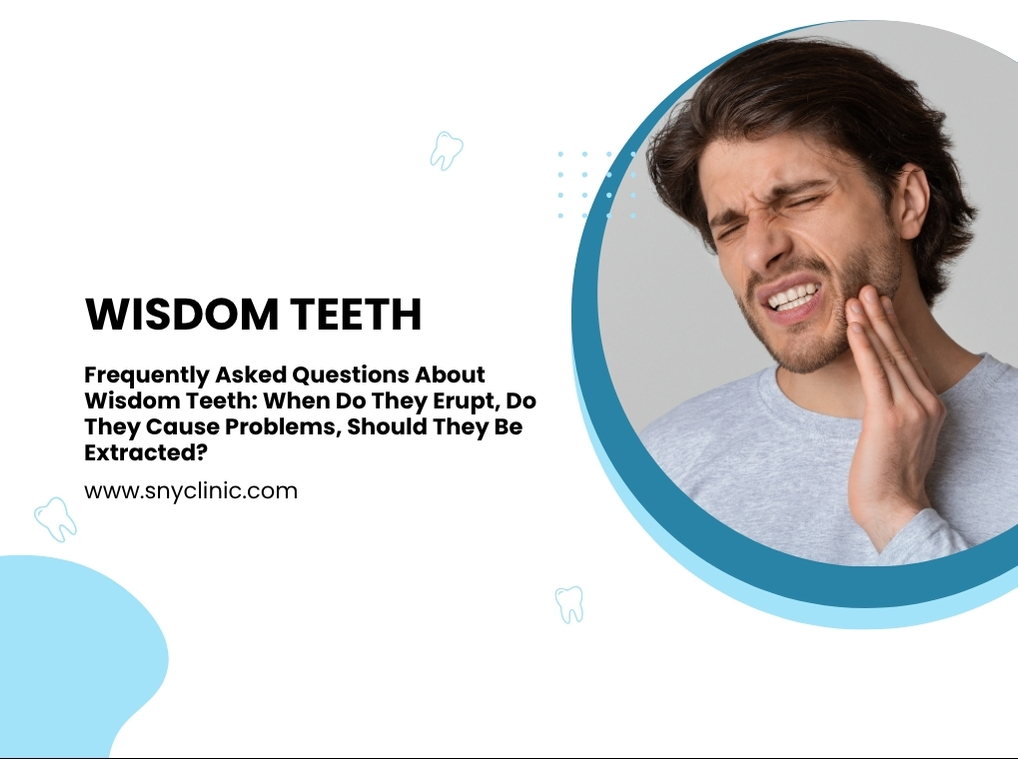
Wisdom Teeth
Wisdom Teeth
Frequently Asked Questions About Wisdom Teeth: When Do They Erupt, Do They Cause Problems, Should They Be Extracted?
One of the most frequently asked topics related to oral health is “wisdom teeth.” Many people wonder why these teeth cause pain, whether they will erupt or need to be extracted. In this article, we explore every aspect of wisdom teeth, their potential dangers, and modern treatment approaches.
What Are Wisdom Teeth?
Wisdom teeth are the third molars located at the very back of the jaw. They typically begin to erupt between the ages of 17 and 26, and most individuals notice them within this age range. Due to their late eruption, they are also referred to as “third molars.” Although these teeth were once essential due to historical dietary habits, many people today either never develop them or they remain impacted.
Does Everyone Have Wisdom Teeth?
No. Some individuals may not develop one, several, or any of these teeth. This is largely influenced by genetic factors. In addition, some people may not have enough jaw space, causing the teeth to remain impacted or partially erupted.
Why Do Wisdom Teeth Cause Problems?
Wisdom teeth can cause issues if there isn’t enough room in the jaw for them to emerge properly. They may become impacted or erupt at an angle. Potential problems include:
• Impaction
• Pressure on adjacent teeth, causing misalignment
• Infection
• Cyst formation
• Gum inflammation
• Pain, swelling, and difficulty chewing
Wisdom teeth that erupt properly and align with other teeth generally do not cause problems.
How Can You Tell If a Wisdom Tooth Is Impacted?
Impacted wisdom teeth often present with clear symptoms such as:
• Throbbing pain at the back of the jaw
• Pain extending to the ear, head, or neck
• Swollen and red gums
• Difficulty opening the mouth
• Bad breath
• Systemic symptoms like fever and fatigue
Panoramic X-rays can easily determine the position of these teeth.
Should Wisdom Teeth Be Extracted?
Not all wisdom teeth require extraction. However, removal is recommended in the following cases:
• The tooth is impacted
• It causes pain or inflammation while trying to erupt
• It leads to decay or shifting of neighboring teeth
• It interferes with orthodontic treatment
• It causes recurrent gum inflammation due to cleaning difficulties
The decision to extract should always be made by a dental professional based on examination and X-ray evaluation.
How Is Wisdom Tooth Extraction Performed?
Depending on the position of the tooth, extraction can be simple or surgical. If the tooth has fully erupted, it can be removed under local anesthesia. If it is impacted, a surgical procedure involving gum incision may be required. This typically takes 30-45 minutes.
Normal post-surgical symptoms include:
• Mild swelling
• Dull pain
• Temporary difficulty chewing
Post-Extraction Care
To ensure faster healing, it is important to follow these steps:
• Do not rinse or spit for the first 24 hours
• Avoid hot beverages
• Refrain from smoking and alcohol
• Avoid hard foods
• Take prescribed painkillers and antibiotics regularly
• Apply cold compress several times a day
What Happens If a Wisdom Tooth Is Not Removed?
Failure to address impacted wisdom teeth may lead to:
• Decay in adjacent teeth
• Gum disease
• Abscesses and cysts
• Jaw joint pain
• Misalignment of teeth
Therefore, regular dental check-ups are crucial to assess whether the wisdom teeth pose any risk.
Common Myths About Wisdom Teeth
❌ “All wisdom teeth must be extracted.”
False. If there is enough space in the jaw and the tooth has erupted properly, extraction is not necessary.
❌ “Wisdom tooth extraction is very painful.”
False. Anesthesia prevents pain during the procedure. Mild discomfort afterward can be managed with painkillers.
❌ “If my wisdom tooth hasn’t erupted, it’s not a problem.”
False. The tooth may be embedded in the bone and still cause issues over time.
Wisdom Teeth Should Be Monitored
Wisdom teeth are the last and most unpredictable guests in your mouth. While they may settle quietly in some, they can become impacted or erupt at odd angles in others—posing a hidden threat to neighboring teeth, jawbone, and overall oral health. Even if you don't feel any pain, it’s important not to ignore these potential risks. Therefore, visiting your dentist at least once a year to check the status of your wisdom teeth is one of the best precautions you can take to avoid future painful, complex, and costly treatments. Remember, early awareness is the key to a healthy smile.




